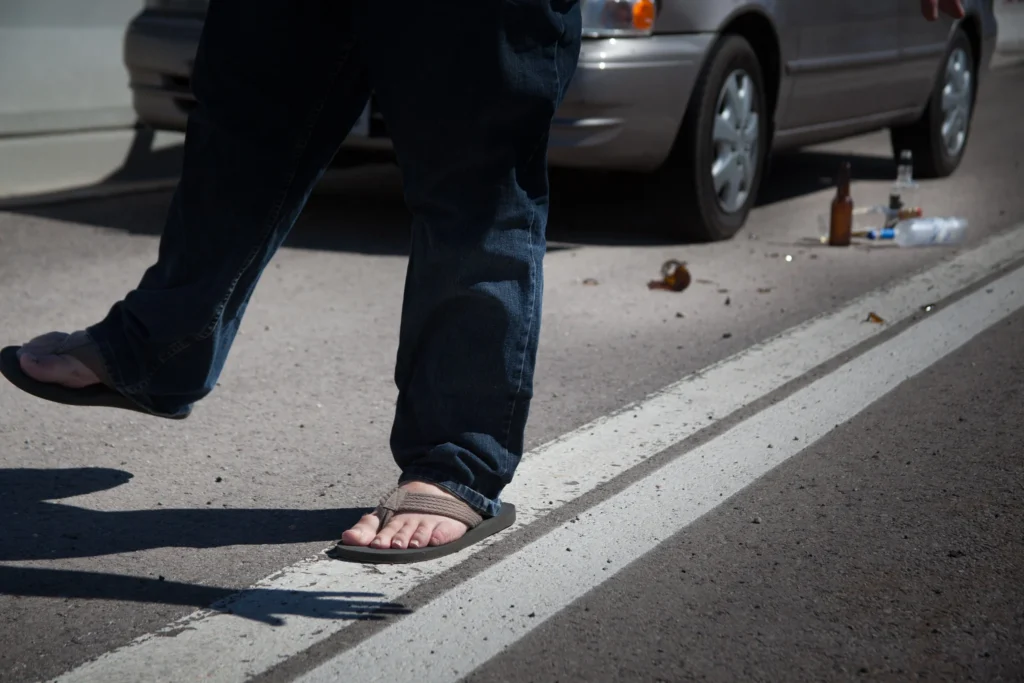Understanding What A DUI Is
Driving under the influence (DUI) means operating a vehicle while impaired by alcohol, prescription drugs, or illegal drugs. The legal definition of DUI varies by state but generally means a blood alcohol concentration (BAC) of 0.08% or higher for adults. DUI and DWI (driving while intoxicated) are often used interchangeably, but some states make a distinction between the two based on BAC levels or specific substances involved. Knowing the laws and recognizing the signs of impairment is key to safe driving.
Legal Consequences
A DUI conviction can have some serious legal consequences, ranging from fines and license suspension to even a possible stint in jail.
These punishments vary in severity based on the state and particular circumstances surrounding your violation, but all highlight the seriousness of driving under the influence.2
- Fines: DUI convictions come with hefty financial penalties. These include court fines, which may differ depending on the offense committed. Apart from all these fines, extra charges like administrative costs are usually added and accumulate quickly.
- License Suspension: If you are convicted of a DUI, the suspension of your license becomes almost unavoidable. The duration of this suspension varies based on elements such as previous offenses and the blood alcohol concentration (BAC) at the moment of arrest. Resulting penalties may include the loss of driving privileges or possibly even having to get an ignition interlock device in your vehicle.
- Jail Time: In some cases, a DUI conviction can result in jail time. A first-time offender may spend a short time in jail, but for people involved in accidents or those who have repeated offenses, it may be extended. Imprisonment is a serious DUI-related consequence that highlights the importance of never driving under the influence.
- Attorney Fees: The fee for representation is another big necessity. A DUI trial normally involves a specialty attorney, and the legal fees, as well as court costs, can become too expensive to bear. It’s important to consider all these financial consequences in the broader view of the impacts occurring as a result of a DUI conviction.3
Personal Consequences of DUI
A DUI conviction doesn’t just affect you legally—it also reaches you on a more personal level. It can ruin your reputation, put some degree of distress on your loved ones, and affect your mental state. Friends, family members, and coworkers may even look at you differently, and it could take some time to regain their trust. A DUI carries a lot of stress, anxiety, and sometimes depression—all the more reason to seek support from family, friends, or professionals during such times.
Got a DUI? Learn About Our DUI Screenings and Classes in Arizona!
- Court Approved
- Self-Paced
- Low Cost Guaranteed!
- MVD & DMV Approved
DUI and Its Impact on Employment
DUI-related consequences can have quite an impact on your career. It could very well mean losing your job, especially if you have a job that requires you to have a clean driving record to keep a professional license or for which driving is an integral part of the job. You may also find it difficult to get other jobs later on since most employers conduct a background check and take a DUI conviction quite seriously. Your professional licenses can be revoked, too, which would make things even worse in your career. Being upfront with your employer and seeking legal consultation with the help of an attorney can lighten the load.
Quick Tip
Practical Safety Tip
Always plan for a safe ride home if you plan to drink. Use ride-sharing apps or public transportation or arrange for a designated driver to avoid all the DUI-related consequences it surely will bring you.4 Plan and save yourself from the severe consequences of a DUI.
Societal Consequences of DUI
DUI-related consequences are not only an individual problem but one that holds much greater shadows over society as a whole. Driving under the influence heightens the risks on the road, leading to accidents and injuries that put everyone at risk.
Healthcare costs also rise due to the treatment of DUI-related injuries, further burdening society. Furthermore, losses occur in economic terms through loss of productivity and restriction of employment opportunities.
In addition, DUI cases place a strain on legal and penal systems, wasting valuable resources that could be used more constructively elsewhere.
Here’s a list of some of the many other societal impacts outlined below:
- Higher risk of accidents and injuries
- Higher healthcare treatment costs for DUI-related injuries
- Economic setbacks arise from diminished productivity and difficulties in employment.
- Pressure on the judiciary and penitentiary institutions
Preventing DUI incidents requires community awareness and a sense of shared accountability on behalf of the community—the problem belongs to us all.
Prevention Methods to Avoid DUI
- Plan Ahead for Transportation: Plan not to drive after drinking by designating a driver or arranging for a ride-share.
- Know Your Limits: Know how alcohol affects your mind and body, and never drive after a quantity that impairs your judgment.
- Take Advantage of Public Transportation: Resist the urge to get behind the wheel after enjoying a drink.
- Stay Overnight: When possible, either stay with a friend or book a room to avoid driving under the influence.
- Encourage Responsible Drinking: Make sure that the culture among friends and peers is to drink responsibly and never to drive after having alcohol.
Arrested for DUI in Arizona?
Cornerstone offers a lifeline with certified DUI classes and screenings—take the first step towards putting this behind you.
Frequently Asked Questions
The potential immediate consequences of a DUI can include fines, license suspension, and possibly jail time. These consequences can vary significantly based on the specific nature of your offense, such as if it is a first-time or repeated one, greatly differing the intensity of your punishment.1
Yes, a DUI conviction can cost someone their job and make it difficult to get another job—especially jobs that require a clean driving record or professional license. Employers may view a DUI as a liability or a sign of unreliability, which can limit your career advancement or even get you fired in some cases.
If you’re facing a DUI charge, you may mitigate the effects by consulting with an attorney, signing up for a DUI class, or volunteering. This can help show that you’re seriously interested in atoning for your actions.
Moving Forward Responsibly With Cornerstone DUI Support
Understanding the full scope of DUI-related consequences, including the legal, personal, and societal impacts, puts you in a better position for decision-making later on. Responsible behavior and proactive steps are warranted to avoid DUI incidents and reduce their burden.
If you or someone close to you is dealing with DUI-related consequences, seek help from our supportive team at Cornerstone DUI today. Let us guide you through this difficult time with our counseling and DUI Education Programs so that you can make better choices toward a successful tomorrow.
Key Takeaways
- Understanding DUI-related consequences is important to avoid future incidents and promote responsible behavior.
- Legal penalties for DUI can be strict, yet different from state to state.
- Personal and societal consequences of DUI reach beyond the legal consequences into almost every aspect of life and society in general.
- Proactive steps and rehabilitation programs help facilitate the after-effects of a DUI conviction.






